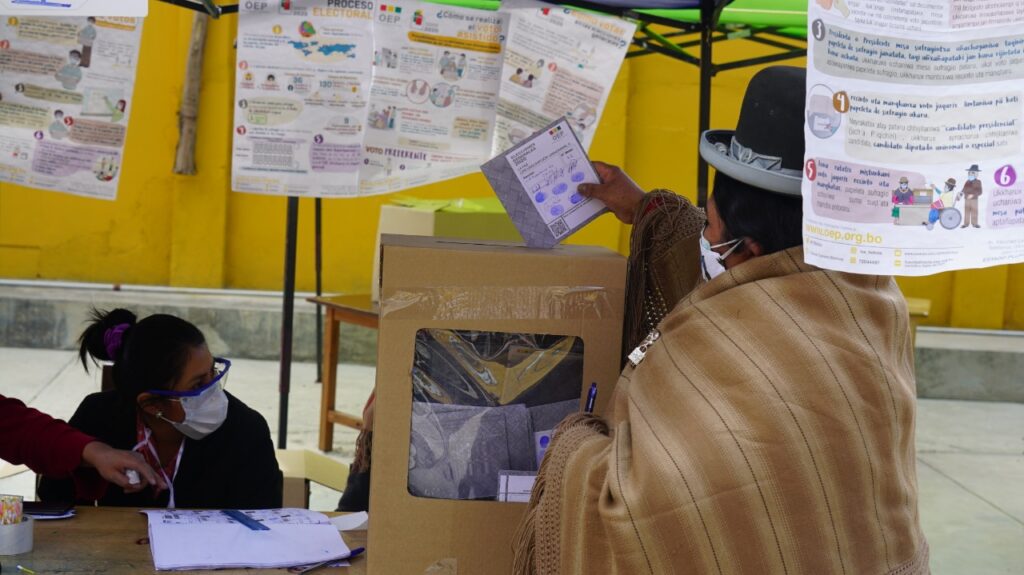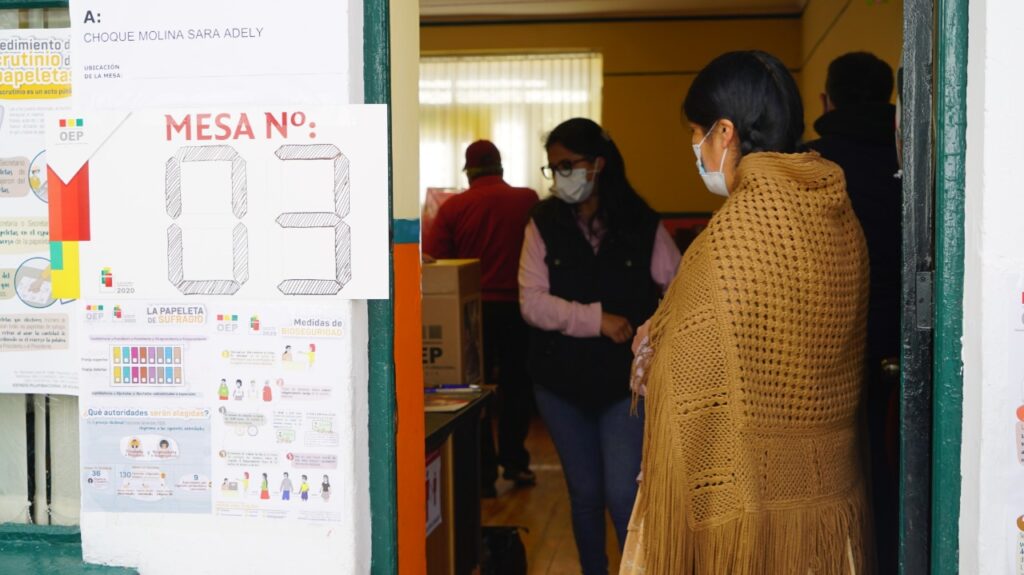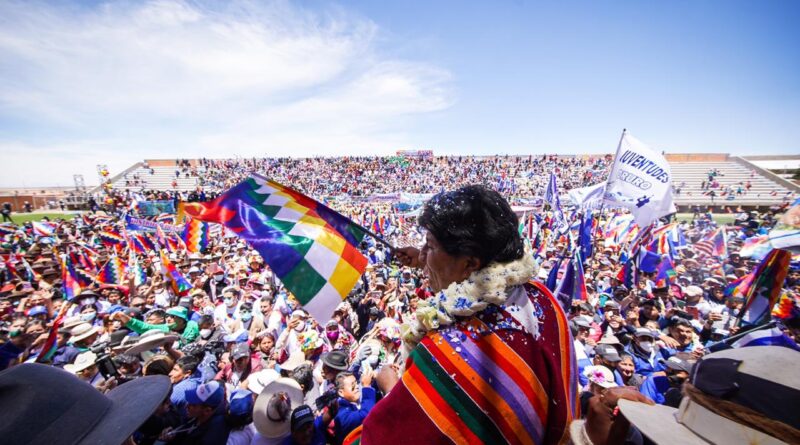Bolivia and Necessary Self-Critique: “It is not enough to have the government, we have to have people’s power.”
Leaders from the progressive world highlight that “organized peoples make revolutions.”
By Alina Duarte
From La Paz and Washington DC
Although the extreme right and their paramilitary groups sought to prevent it by any means necessary, Luis Arce Catacora won the presidency of Bolivia, and Evo Morales returned home from exile in Argentina.
After a year of deep economic, political and social crisis, as a result of a coup d’etat and a de facto government characterized by repression, racism and corruption, the Bolivian people again have a democratically elected government. This opens the way for new paths, debates and proposals for actions to resume and fortify the “process of change” inaugurated in 2006 with the arrival of Evo Morales to the presidency.
Beyond the overwhelmimg 55.11% victory of the Movement Towards Socialism (MAS) at the polls in the elections on October 18, it is important to point out that Bolivia breathes not winds of continuity, but of change. The resistance, organizations and social movements have been invigorated, renewed and strengthened after dozens were killed, many others faced political persecution and some leaders were forced into exile, including the former president Evo Morales himself.

But although Evo, his former cabinet, the MAS, and constituents, return to the Government Palace with their heads held high and with the backing of millions, self-criticism seems to be the strongest card that the MAS has to advance. The willingness to engage in self-critique is the most important lesson to offer the region and the popular movements for emancipation. And it is indispensable for overcoming the dilemmas of what seems to be the indications of a second progressive wave in the Latin American region.
Self-Critique and Popular Power
The MAS, formally MAS-IPSP (The Political Instrument for the Sovereignty of the Peoples), reassumes power and faces a great challenge: to return to its origins. While those abroad may view these origins as centered around being a political party, internally the priority falls on the second part of the name: “political instrument”. This “political instrument” is reconfiguring itself today to contest power. At the same time it enables the formation of cadres and combats the regression caused by the coup as well as by errors committed in the process of change.
“We need an instrument to help us fight for the revolution and for power (…) It is known what we no longer want: racism, oligarchs, and exclusion. But we need to build communitarian socialism with the people and that is why we need to keep fighting,” says the sociologist and former coordinator of citizen training in the Vice Presidency of the Plurinational State, Juan Carlos Pinto Quintanilla, during an interview with the author in La Paz, three days after the presidential elections that gave the victory to the Arce-Choquehuanca ticket.
During the interview, Quintanilla also stressed the importance of constant self-criticism and of recognizing the errors that allowed a coup to be carried out, despite the belief in the strength of political institutions. For Quintanilla, the role of the population should be a fundamental part of the analysis.
It is not enough to have the government
“We don’t just need the will of the people to sustain the process, but also their re-politicization. This means that the leadership on this parallel path has to be renewed. It has to be strengthened because we have always mistakenly thought it is enough that we are in government. It is clear that it was not enough to do public infrastructure projects if there is no awareness among the people about what they were going to defend. And to defend, they have to have a perception of the political horizon within which they have to work and build. That is why we are also pushing the issue of popular power as an important axis that must be built. It is not enough to have the government. We have to see how we decentralize it so that the real power is with the people.”
The complex challenges facing Bolivia are clear.
“It is not enough to have the government. We have to see how we decentralize it so that the real power is with the people.”
Juan Carlos Pinto Quintanilla
The Movement Toward Socialism was not born as a political party, and internally it still expresses a plurality of political positions. This plurality has contributed to the victory, genesis and configuration of the process of change. However, “being so diverse it has also generated a weakness because it has not strengthened the axis of discussion,” says Pinto Quintanilla.

“Everyone has participated from their own perspective, from their vision of how to build an alternative to the neoliberal world, but sometimes that construction is not enough to the extent that it has been pursued by the progressive government that we have had. The axes are once again found in the capitalist market and in the project of meeting the fundamental needs of the people, but not in going beyond capitalism,” says Pinto Quintanilla.
Given this mix of darkness and light, América Maceda Llanque, who is part of the Abya Yala Community Feminism movement, agrees: “Self-criticism is what we most have to offer.”
She adds that “you have to be critical and self-critical within the process of change. Although the material conditions of the population have improved, this has not been accompanied by a process of political formation, conscience, self-awareness and self-criticism, and that is why the Bolivian people have also had to pay for mistakes ”.
It should be noted that while Bolivia was one of the countries with the highest economic growth in the region during the last decade (annual GDP growth of 4.9% between 2006 and 2019), when walking the streets of La Paz, MAS militants clearly see that economic growth and development (one of whose main architects was precisely Luis Arce) were not enough to sustain a process that allowed, with relative ease, a coup d’état.
“The fundamental task—at least for us women—is to wage a cultural, democratic revolution. That is the path we have chosen with the Bolivian process of change because we know that governments do not make revolutions; we the people—through our organizations—create revolutions.”
America Maceda from the Abya Yala Community Feminist Movement
A community leader in office and the effect of demobilization
One cannot decipher with surgical precision how a coup of such magnitude was able to happen in Bolivia. However, América Maceda lays out some of the causes: the demobilization of social movements, too much bureaucracy, and a rightward shift in some sectors of the administration.
“Over the course of 14 years our social movements demobilized, despite the fact that we have very rich historical memory and strong union organizations in Bolivia. And we have specifically fought against the ruling class and a political class that served the colonialist, capitalist elites of the country. There were just a few who governed and who virtually excluded most of the indigenous and peasant majority of the country. Our enemies were physically in office, holding onto power (…). You knew where your enemy was physically, they were the ones who wielded power,” explained Maceda. “But when one of us, one of our brothers, a coca farmer, an indigenous peasant leader, one of our native peoples took power through a democratic process and led what we have called a democratic and cultural revolution, the enemy is no longer the one who physically holds office and is no longer in our line of sight. So we demobilized. But our enemy was in fact still there. Our enemy was capitalism, patriarchy, colonialism, even though we could not see it physically.” She adds that, “as a result, we could not mobilize for our brother the President, you could not lead a march, a protest. And that is how the social movement organizations also became bureaucratized.”
One year after the coup, the mistakes and criticisms of the pre- and post-coup scenario are fueling another discussion, a discussion about the tasks and challenges to be faced in the aftermath of an election that gave an overwhelming victory to the MAS.
Revolutions are waged by the people through their organizations
“The task of social movements is to continue deepening the process of change, to continue giving mandates; to tell the government—headed by our friend—what it has to do. And that is the role we must now play. While the government itself had become bureaucratized and had moved to the right in certain moments, implementing contradictory policies for what was supposed to be ‘living well, mistakes were made. The population, the social organizations and social movements, have adopted the logic of wanting to be in office when the fundamental task—at least for us women—is to wage a cultural, democratic revolution. That is the path we have chosen with the Bolivian process of change because we know that governments do not make revolutions; we the people—through our organizations—create revolutions.”
According to this analysis, being a “movement of movements” that consolidates people’s power, continues to be the main challenge.
Other key factors
Though they are sometimes left out, we want to be sure to mention two factors that should not be forgotten in the anti-capitalist, anti-imperialist, and anti-fascist agenda that is defending life on this planet.
The first is international solidarity. We must revisit the need for international and regional organizations such as ALBA and UNASUR, which were dismantled by the right-wing governments of the region that regrouped to serve interference and interventionism through the Organization of American States and the Lima group, to big effect.
The fact that Mexico did not hesitate to take a decisive stand during the coup, and that the newly elected government of Argentina offered Evo exile in its territory, shows everyone that the lack of an internationalist organization opens the door to fascist and imperialist intervention against progressive government.
But it is not up to governments alone. International solidarity showed that pressure on embassies, debates, public statements, and social media campaigns first and foremost raised the visibility of the coup, and secondarily, exerted key pressure on the organizations and governments that were orchestrating or legitimizing the atrocities committed by Jeanine Añez’ government.
The second, but no less important, factor was that journalists refused to stop calling it a coup d’etat, despite the international media blockade. Independent and local journalists disputed the narrative imposed by corporate media and international organizations that were serving as mouthpieces of the oligarchy.
While the de facto government rushed to take international media outlets such as Telesur and RT off the air, and by closing other television and radio stations and imposing its own editorial line on the media, the information siege was breached by social media. Outlets such as Kawsachun Coca, and its English version Kawsachun News, self-financed by the Tropical Federations of Cochabamba, continued their work despite the crackdown.
Risks during the post-coup period
Social media accounts allege that the Arce-Choquehuanca administration could turn out to be reactionary like the Lenin Moreno administration in Ecuador. But the base of the MAS has been bolstered by its resistance to the coup, and those who manned the barricades laugh at that prospect. Within the MAS, in the streets and among its members, there are no such fears. They seek to decentralize the process of change. First, because they have the leaders to do it, and second, because the base is mobilized.
But there are threats. The far-right groups have not been dismantled and used prayers, threats, blockades, and/or weapons to try and neutralize the people’s victory and cling to a coup government that had clearly been defeated.
With their Nazi symbolism and hate speech, the Santa Cruz Civic Committee and the Cochala Youth have headed up the defense of coup by alleging –without evidence just as they did one year ago– that on October 18th there was electoral fraud. And even though the Supreme Electoral Court, the Organization of American States, and the U.S. State Department have turned their backs on them, they continue to claim there were irregularities in the election.
The actions of these far-right groups are not simply statements, blockades, or prayers. While the exact perpetrators and masterminds remain unknown, on the night of November 5, shortly after the election, there was an explosion at the MAS’s La Paz headquarters while President-elect Luis Arce was inside.
Putting an end to the impunity that these paramilitary groups enjoyed should also be on the agenda of the incoming administration.
Pending issues of the present and future
Upon his return to Bolivia on November 9, addressing the hundreds of people who awaited him at the Argentina-Bolivia Border, Evo summarized the immediate challenges:
“We will keep working. Now we have to protect President Lucho (Luis Arce), and defend our process of change. The Right has not died and is not sleeping. Imperialism has not stopped coveting our natural resources. But we have been made stronger by this experience; the time for tears has passed and it is time to get organized. As always, we will give birth to new social programs, new economic policies. Along with Lucho, we are going to lift up our economy–an economy that is essentially at the service of people of very modest means.”
While it is true that the coup was defeated, there is work to be done to reverse its setbacks, both in the armed forces and in a society that suffered deeply from economic and social blows. It will be necessary to tear down the barriers of a bourgeois democracy that blocks the progress and consolidation of people’s power, community-based socialism, “Living Well,” Sumak Kawsay (Quechua), or Suma Qamana (Aymara).
The country must cultivate leaders that “govern by obeying” and can meet the expectations of a society whose consciousness has been raised after suffering first-hand the wounds of fascism. The media must be restructured and commit itself to the emancipation of the people. There must be a strengthening of international solidarity, both through governments and through activists who favor life and believe that another world is possible. There are all some of the issues that Bolivia still faces after setting an historic example of dignity to the world.
If those who fight for life and the belief that another world is possible–doing so through journalism, academia, work in the neighborhoods, in factories, in social movements and organizations, in communes, and the different battlefields within and outside institutions–do not learn from the mistakes, criticisms, debates, and lessons of these Bolivians who defeated fascism in the 21st Century, then we should not be surprised if the new face of the radical right brings us more blood, death, and despair.
Alina Duarte is a Senior Research Fellow at the Council on Hemispheric Affairs, COHA.
Republication of this article is authorized with attribution of the original source, the Council on Hemispheric Affairs (COHA),without modification of the content, and with a link to the original article: https://coha.org/bolivia-and-necessary-self-critique-it-is-not-enough-to-have-the-government-we-have-to-have-peoples-power/ ]


